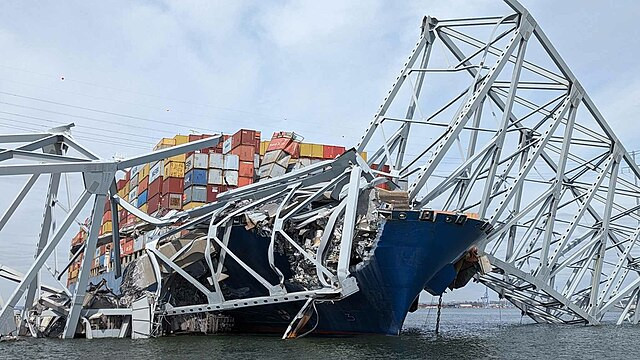The tragic collapse of the Francis Scott Key Bridge in Baltimore on Tuesday has not only claimed lives but also shed light on the dangers faced by the growing Latino labor force in the construction industry. Among the eight construction workers who were fixing potholes on the bridge when a cargo ship crashed into it, most were originally from Honduras, Guatemala, El Salvador, and Mexico.
Two workers survived the incident and were rescued from the water, while search efforts for the remaining six were underway all day Wednesday. The families of the missing workers, presumed dead, are grappling with the devastating loss of their loved ones. "My brother is the engine of the family. He was everything to us; he was the best," Norma Suazo, sister of missing Honduran worker Maynor Suazo, tearfully told Noticias Telemundo.
Latinos make up about a third of the nation's construction workers, exposing them to serious risks such as falling from rooftops, being struck by heavy equipment, and being hurt or killed by unguarded machinery. The Occupational Safety and Health Administration considers construction a "high hazard industry" due to these dangers.
Among the missing and presumed dead are two Guatemalan nationals, José López and Dorlian Castillo Cabrera, whose body was recovered on Wednesday evening. The body of Mexican worker Alejandro Fernandez Fuentes was also recovered that evening, while another Mexican national remains missing. Maynor Suazo of Honduras and Miguel Luna of El Salvador have been identified as missing by friends and family.
The tragedy has hit Latino and immigrant communities nationwide hard. Bruna Sollod, senior political director of United We Dream, said in a statement, "Each and every single one of these men were a part of the very fabric that helps make Baltimore a thriving, vibrant, and safer community. They are a reminder of the often unseen care immigrants pour into our cities and communities every day."
The Baltimore bridge collapse may result in the biggest-ever marine insurance payout, according to Bruce Carnegie-Brown, chair of Lloyd's of London. Analysts forecast insured losses to amount to a figure in the single-digit billions, with potential claims for the ship, cargo, bridge, and substantial second-order impacts such as business interruption and supply chain disruption.
The port of Baltimore, the 11th biggest in the U.S. and the country's busiest for auto imports and exports, is scrambling to minimize the impact on trade. Global autos firms, particularly German manufacturers BMW, Mercedes, and Volkswagen, are assessing the impact on their operations and expect to reroute trade, extending some delivery times.
As investigations are carried out by authorities in Singapore and the U.S. to establish legal liability, the complex process could take months or years. The incident has not only highlighted the risks faced by Latino construction workers but also the far-reaching economic consequences of such disasters.




